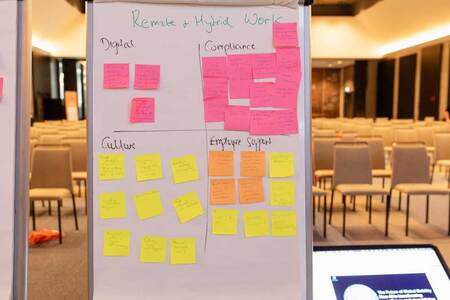If you attended FEM's European Conference 2025, we hope you enjoyed taking part in the Vision 2030 – The Future of Talent Mobility workshop run by The RES Foundation.
As you may recall, this session was part of a new research project that the RES Forum is undertaking this year and FEM is pleased to be sharing with our community.
On 7th March our audience broke out into three groups to explore the key themes:
- Sustainable Global Careers
- Remote & Hybrid Work
- Gig Economy
We collated and photographed the feedback that each of the three groups yielded so please take a look at the notes below.
We would really appreciate your on-going participation in this project and so the RES Forum have given us a direct link to their research site where you can get involved:
http://8304959.hs-sites.com/vision-2030-0
We will continue gathering information on the topic from the FEM community in every region throughout the year and then the RES Forum’s Director, David Enser will return to our EMEA Summit in London on 20th & 21st October to present the findings.
Do get involved and have your say!
Sustainable Global Careers
Section 1
- Active community building to ease the successful landing of expatsReduce mental anxiety by preparing the children for their trip and coming back (“Me and my big move”)
- High impact on people when a business leaves (mental wellbeing)
- As a serviced apartments provider we organize community events for expats to combat loneliness Acknowledgement that mental health varies by culture – Asian cultures don’t talk about it as much as European etc.
- Different generations have different approaches to mental health. Younger generations and Gen X are more open to communicate about its importance than previous generations.
- Employee Assistance Programs Reduce mental anxiety by giving an educational perspective and explain the options
- Realise the importance of the family language (also in multi-lingual families) in order to make the careers sustainable Inform before relocation educate about changes
- Repatriation – ensuring the needs of the employees are met and the business knows how to use the newly-learned skills of the employee
- Hours for employee for self-development
- Active community building to ease the successful landing of expats
Section 2
- Hybrid working skills development – upskilling, flexibility, formal career development plan
- ESG progress – shared commitment
- Skill sharing & focus on initiatives
- Personal Fulfilment & Personal Development
- Regional industry & cultural differences
Section 3
- Transferable skills development as core
- Employee wellbeing?
- Gen Alpha – other needs
- DEI Interdisciplinary careers & full life tracking
- Regular checks on wellbeing
Section 4
- Save costs – invest in partner support
- Expat/FLMs – wellbeing greatly depends on wellbeing partners
- Fair and consistent rewards programs.
- Good understand of the purpose of the role and opportunities on return
- Flexible relo assistance
- Choice of the customer
- Workation policy

Remote & Hybrid Work
Digital:
- IT security, tracking, cybersecurity, VPN, software updates Internet availability
- Different digital solutions for team work
- Costs of having infrastructure
- Privacy tracking – where they are what they do.
Compliance:
- Location tracking Compliance: Tax – exceeding number of days Employment contract exceeding terms. Pension, social security
- Increasing compliance risk
- Data risk
- PE risk
- Managing compliance risk and employee experience
- Payroll issues
- Flexible arrangements (eg Fridays from home)
- No remote working – requirement that entity needed
- Industry dependent Knowing where your people are
- Allows for attracting talent = flexibility
- Putting into policy for cross border working vs manager flexibility
Culture:
- Concept changed –
- Do we define cohesion? What is your identity?
- Geographical culture – Religious
- Corporate culture
- New ways of engagement – glue has changed
- Retention challenges – belonging
- Task focused – less relationship
- Navigated culture on screen
- Finding ways – events/games
- Allow for chit chat
Employee Support:
- Technology to engage and train
- Hiring the talent that can embrace working remotely
- Compliance tools to support employee requests
- Virtual office space/open door policy
- Clarity of policy
- Technology innovation
- Well-being resources
- Ensure compliance for the company
- Clarity on personal responsibility

Gig Economy
- Advantage: Flexibility to address spikes in workload – can reduce up and down – flexibility to not need to hire within new market – low risk to try something new
- Advantage: New generation appreciate short term solution. No fixed cost for employers – reduces risk of redundancies to hire as and when skill is needed
- Risk – NL – Contractors’ long-term relationship with company
- Integration – Immediate resource but can’t fully integrate due to ST contract.
- Flexibility – short term perspective
- Flexibility/agility: Zero hour contracts- no strings, ST contracts, flexibility, younger generation digital nomads, remoteness, fragmented resource
- Assignment marketplace
- Having too many contractors without looking at the needs
- Data Workforce planning
- Technology/tools – Contractor – Employer of record assistance, technology developed for freelancers/gig population for contracts/payment
- Risks – Different gigs in same industry can be a risk – confidentiality & knowledge
- Compliance – contractor vs short-term contract
- Projects related to kind of company
- Disadvantage: More challenging for corporation to retain talent. Compliance is often tied to employment for cross-border moves. Difficult to move them. Financial risk for employer
- Disadvantage: No long term planning. No benefits. Compliance – social security. Less stability for employee
- Compliance/contracts: Short term contracts -flexibility. Could pose challenges /issues with immigration and /or tax
- Responsibility on freelancers to ensure immigration/tax compliance
- Limitations on number of contracts issued
- Budgets



